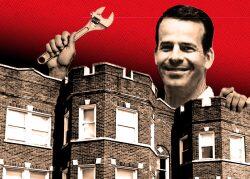One of Chicago’s largest landlords allegedly overcharged tenants who had Section 8 vouchers, potentially costing the Chicago Housing Authority upward of a million dollars each year. And yet, CHA stopped investigating the landlord, Pangea Properties, after finding initial evidence of the taxpayer ripoff.
The matter is now being litigated in a lawsuit filed by whistleblower Antoni Muhawi, which charges Pangea with defrauding the government and seeks to recover damages and penalize the company.
Complaints of misdeeds first came nearly a decade ago, long before Pangea Properties sold its portfolio of 7,500 apartments spread across more than 400 buildings in late 2022.
CHA officials found evidence Pangea was overcharging in a 2015 investigation of the company’s rent rolls, but dropped the matter before a full analysis could be done, making “no final determination,” according to testimony included in court documents.
Cheryl Burns, who now holds the top position within the program, testified that she doesn’t remember why CHA stopped investigating. CHA representatives declined to respond to The Real Deal when asked why it discontinued the investigation.
The whistleblower lawsuit claims Pangea had an internal policy to quote voucher holders a monthly rental amount that was $150 more than it would ask of a market-rate tenant. The suit claims Pangea would then lie on paperwork filed to CHA to hide that it was charging tenants with subsidized rent more than unsubsidized units — a cost that taxpayer dollars covered.
When CHA looked into the matter following complaints from tenants, Pangea employees allegedly withheld information and set up roadblocks to make its data more difficult to analyze, exhibits filed in the lawsuit show.
The CHA’s decision to drop its investigation came despite analysis of 52 units that showed it was overpaying Pangea for 42 of them, a loss of “upwards of $4,000 each month,” according to an email cited in court documents. The same rate of overpayment for all of Pangea’s 1,130 units with vouchered tenants would mean CHA was losing upward of $1 million each year.
The landlord appears to be deploying a legal strategy that counts on its concession that it charged voucher holders more “in some instances” along with a contention that the CHA was aware of this.
CHA denies it knowingly allowed Pangea to charge voucher holders more than market-rate tenants. Burns testified that CHA never made payments knowing Pangea was giving false information, according to court documents.
Pangea’s legal troubles — for which the whistleblower could earn a payout, if the allegations hold up in court — are just the tip of the iceberg.
Other housing authorities across the nation have unknowingly or knowingly overpaid landlords for voucher holders, according to a Washington Post investigation and an expert on the Housing Choice Voucher program, Ruth Anne White.
Most of the apartment buildings in Pangea’s former portfolio in Chicago were on the South Side and West Side, fitting a pattern of landlords within CHA’s voucher program being concentrated “in lower cost, predominantly Black neighborhoods,” the DePaul Institute for Housing Studies’ Geoff Smith said. Such areas have proved to be fruitful for owners who have found gaps between what these rental markets can bear and what CHA will agree to subsidize, Smith said.
“It’s a stable stream of income, you might be able to charge a little bit higher than the market can bear,” Smith said. Particularly following the recession and ensuing foreclosure crisis, “I don’t think it’s a surprise or an uncommon business model where you would see landlords or investors buying lower-value real estate in these distressed neighborhoods with the intent to rent to voucher holders for that purpose.”
CHA’s calculation of the fair market rate for renting a unit in a distressed neighborhood can be skewed by data from nearby, higher income areas, and the system for certifying that landlords are charging a reasonable rate relies, in part, on self-reporting from property owners themselves.
Pangea allegedly gave false information to the CHA on these certifications, charging CHA substantially more than it should have for housing voucher tenants across its portfolio since at least 2012. If CHA or HUD was able to prevent this behavior, it could have stopped Pangea from collecting “tens of millions” in housing assistance payments “to which (it was) not entitled,” according to the lawsuit.
But the 2015 investigation raises questions about whether CHA looked the other way to continue working with its program’s largest housing provider at the time.
“One would hope that that bad actor wouldn’t be allowed to participate,” National Housing Law Project Deputy Director Deborah Thrope said. For families on the waitlist for vouchers, “they are less likely to receive a voucher if the landlord is overcharging and the housing authority is turning its back.”
Overpaying voucher rents places upward pressure on the market, making housing less affordable for those who don’t hold vouchers, said White, executive director of the National Center for Housing & Child Welfare, whose organization gets voucher families into homes.
CHA declined to answer specific questions, but said it doesn’t deviate from procedures used to determine market value when making rent offers, spokesperson Matthew Aguilar said in a statement.
“CHA provides families with choices about where they live. CHA takes this responsibility, as well as its responsibility to be a good fiscal steward of federal funding, very seriously,” Aguilar said.
(The Pangea litigation is one of several recent controversies at the authority. CHA CEO Tracey Scott resigned last month amid growing criticism for leasing CHA land to the Chicago Fire soccer club, allegedly without proper review, and letting publicly owned units sit empty during an affordable housing crisis.)
‘A distorted market’
HUD determines the maximum rent amount CHA should subsidize through the voucher program based on the median rent of the surrounding ZIP code, which can be tricky in distressed neighborhoods, as even ZIP code-specific data may pull in rents from nearby, higher income areas.
For example, the ZIP code that covers most of Woodlawn, which has a median income of $29,969, also includes half of Hyde Park, which has a median income of about $61,000, according to Chicago Metropolitan Agency for Planning data.
Housing authorities also look at rents charged to unassisted renters in comparable units in the same building or neighborhood through “rent reasonableness” tests to ensure they don’t approve inflated rents, Aguilar said. But this process relies, in part, on owners self-reporting rent rates they charge tenants in similar unsubsidized units, according to CHA program guidelines.
These kinds of checks haven’t eradicated the practice of overcharging, but rather “modified or reduced the variation in what you could pocket by renting to a voucher tenant in different markets compared to the market rate,” DePaul’s Smith said.
Given that rental properties are valued based on the cash flow or income generated through rent, this can lead to “overvaluing properties beyond what the actual market might bear,” Smith said. “And creating a distorted market in some neighborhoods where those market valuations are more tied to the reliance on the voucher program, as opposed to other, more traditional tenants.”
This was the case in Washington, D.C., where the D.C. Housing Authority didn’t check whether rents charged by landlords in the voucher program were in line with market values, according to a 2023 Washington Post report. This incentivized owners to turn buildings into “privately-run public housing complexes” and prompted developers to capitalize on an inflated market. The Post’s investigation found that these buildings were often poorly maintained.
A Harvard study from 2016 backs up that major housing authorities have encountered similar issues. In Milwaukee, landlords charged renters with housing vouchers an extra $58 in rent each month on average, costing taxpayers $3.8 million each year or “the equivalent of supplying roughly 620 families with housing assistance,” according to the study.
Chicago renters said Pangea’s buildings were also poorly maintained and that it routinely ignored calls for repairs or failed to adequately fix issues in favor of temporary solutions, according to a 2022 lawsuit filed by its tenants that’s still moving through court.
A main goal of the Housing Choice Voucher program is to give low-income tenants — who typically pay 30 percent of their income toward rent — more choice in where they want to live by helping them enter the private market, White said. The program also aims to move away from segregating affordable housing in low-income neighborhoods or poorly managed buildings.
But in higher income areas, landlords have less incentive to work with voucher holders because demand for available units is high and they know they can get more from a market rate tenant, Smith said.
Public housing authorities like the CHA have been given more flexibility over the years in determining the maximum rents they will subsidize as a way of getting more families off waitlists and into homes in neighborhoods of their choosing, White said. This includes the ability to raise or make exceptions to these maximum rents, with approval from HUD, and offer one-time bonuses to landlords for accepting vouchered tenants.
“My general thought is that it hasn’t been fully successful, you still see those same patterns in the market,” Smith said.
Part of the reason CHA’s waitlist is so backlogged — with 25,000 names on the list as of last year, according to WLS-TV — is due to its struggle to replenish available public housing after demolishing 25,000 publicly owned units in the early 2000s, said Dick Simpson, professor emeritus of University of Illinois-Chicago’s political science department.
“The only stop gap has been to expand Section 8 and hope that the private market would provide housing that the public is no longer providing,” Simpson said.
The case against Pangea
The question of whether CHA knowingly overpaid Pangea will be central to the federal whistleblower case. It’s one of the main things the two parties still disagree on and forms the basis for why Pangea claims it shouldn’t be on the hook to pay damages, according to court records.
The whistleblower originally named CHA as a defendant alongside Pangea because “CHA became aware of (Pangea’s) false certifications,” but continued working with the landlord, according to court records. However, the whistleblower voluntarily dismissed claims against CHA in 2021 after a conference call with its attorneys.
Pangea could be ordered to pay penalties of anywhere from about $10,900 to $21,900 for each “false or fraudulent claim” — in this case, housing assistance payment contracts — submitted to or paid by CHA and HUD, according to court records. On top of the fines, Pangea could also be asked to pay back triple the amount of money it received from the government in damages.
CHA could also bar Pangea and its affiliates from working with the city’s Housing Choice Voucher program in the future.
Read more



A representative of CHA declined to comment on the suit or answer questions relating to Pangea. A spokesperson for Pangea also declined to comment. The whistleblower’s attorney declined to comment, and an attorney for Pangea did not respond to a request for comment.
Pangea in late 2022 sold its Chicago portfolio to New York-based Emerald Empire for about $600 million, one of the most significant multifamily transactions ever in Chicago. Pangea’s property management team was kept on by Emerald to continue operating the assets.
